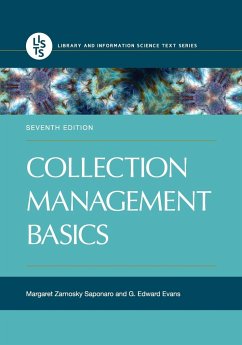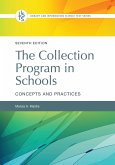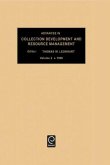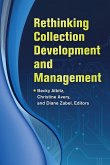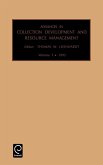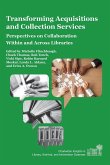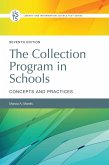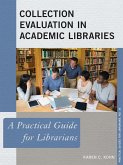- Broschiertes Buch
- Merkliste
- Auf die Merkliste
- Bewerten Bewerten
- Teilen
- Produkt teilen
- Produkterinnerung
- Produkterinnerung
If the heart of the library is its collection, this textbook provides the keys to the heart of your library. Alongside standards of basic principles and processes, you'll find practical guidance on everything from acquisitions to preservation. Managing collections in today's libraries is more complicated and challenging than ever. Electronic formats, new options for collaboration and sharing, and the drive to use data for evaluation purposes are just a few of the changes now driving collection management. This updated edition of a classic text addresses changes in the field and provides a…mehr
Andere Kunden interessierten sich auch für
![The Collection Program in Schools The Collection Program in Schools]() Marcia MardisThe Collection Program in Schools80,99 €
Marcia MardisThe Collection Program in Schools80,99 €![Advances in Collection development and resource management Advances in Collection development and resource management]() Advances in Collection development and resource management169,99 €
Advances in Collection development and resource management169,99 €![Rethinking Collection Development and Management Rethinking Collection Development and Management]() Rethinking Collection Development and Management72,99 €
Rethinking Collection Development and Management72,99 €![Advances in Collection development and resource management Advances in Collection development and resource management]() Advances in Collection development and resource management151,99 €
Advances in Collection development and resource management151,99 €![Transforming Acquisitions and Collection Services Transforming Acquisitions and Collection Services]() Transforming Acquisitions and Collection Services63,99 €
Transforming Acquisitions and Collection Services63,99 €![The Collection Program in Schools The Collection Program in Schools]() Marcia MardisThe Collection Program in Schools115,99 €
Marcia MardisThe Collection Program in Schools115,99 €![Collection Evaluation in Academic Libraries Collection Evaluation in Academic Libraries]() Karen C. KohnCollection Evaluation in Academic Libraries101,99 €
Karen C. KohnCollection Evaluation in Academic Libraries101,99 €-
-
-
If the heart of the library is its collection, this textbook provides the keys to the heart of your library. Alongside standards of basic principles and processes, you'll find practical guidance on everything from acquisitions to preservation. Managing collections in today's libraries is more complicated and challenging than ever. Electronic formats, new options for collaboration and sharing, and the drive to use data for evaluation purposes are just a few of the changes now driving collection management. This updated edition of a classic text addresses changes in the field and provides a thorough overview of what collection development specialists now need to know to effectively and efficiently manage processes that range from selection and assessment to sharing resources, handling challenges, weeding, and preservation. Readers will find increased coverage of technical services, intellectual freedom and censorship, and collection policy development, as well as budget development and tracking, joint purchasing, and negotiating with vendors. Updates on e-resources, user needs assessment (including data visualization), and disaster management, along with suggestions for further reading, are also included. Engagingly written and easy to understand, this is a valuable text for students preparing for careers in public, academic, school, and special libraries. It will additionally serve as a training resource and professional refresher for practitioners.
Hinweis: Dieser Artikel kann nur an eine deutsche Lieferadresse ausgeliefert werden.
Hinweis: Dieser Artikel kann nur an eine deutsche Lieferadresse ausgeliefert werden.
Produktdetails
- Produktdetails
- Verlag: Bloomsbury Publishing plc
- Seitenzahl: 392
- Erscheinungstermin: 31. Mai 2019
- Englisch
- Abmessung: 254mm x 178mm x 21mm
- Gewicht: 735g
- ISBN-13: 9781440859649
- ISBN-10: 1440859647
- Artikelnr.: 54804573
- Herstellerkennzeichnung
- Libri GmbH
- Europaallee 1
- 36244 Bad Hersfeld
- gpsr@libri.de
- Verlag: Bloomsbury Publishing plc
- Seitenzahl: 392
- Erscheinungstermin: 31. Mai 2019
- Englisch
- Abmessung: 254mm x 178mm x 21mm
- Gewicht: 735g
- ISBN-13: 9781440859649
- ISBN-10: 1440859647
- Artikelnr.: 54804573
- Herstellerkennzeichnung
- Libri GmbH
- Europaallee 1
- 36244 Bad Hersfeld
- gpsr@libri.de
Margaret Zarnosky Saponaro, MLS, is Director of Collection Development Strategies at the University of Maryland Libraries (UMD), USA, where she provides leadership for the collections and manages the collections budget. Her prior work experience includes serving as Manager of Staff Learning and Development, and later Librarian for the College of Journalism at UMD, as Associate Director of Learning Resources at the Alexandria Campus of Northern Virginia Community College, and as Librarian for the Northern Virginia Center of Virginia Polytechnic Institute and State University. Her research interests are in the areas of collection management, instruction, and emerging technologies in libraries.
Illustrations
Preface
1-INTRODUCTION
What Is Collection Management?
Access to Information
Access and Value
Access Philosophy and Staff
Access and Literacy
Blended Collections
Access and Collaboration
New Approaches
Points to Keep in Mind
References
2-INTELLECTUAL FREEDOM AND ETHICS
Libraries, the First Amendment, and Intellectual Freedom
Ethics, Personal Beliefs, Biases, and Collection Management
Self-Censorship
Being Challenged
Access-Filtering
Bibliotherapy-Readers' Advisory Activities
Points to Keep in Mind
References
3-COLLECTION MANAGEMENT
Components of Collection Management
Collection Management and Library Types
Institutional Libraries
Public Libraries
School Libraries
Special Libraries
Standards and Guidelines
Emerging Trends in Collection Management
Floating Collections
Taking on Collection Management Responsibilities
Points to Keep in Mind
References
4-COLLECTION MANAGEMENT POLICIES
What Is a Collection Management Policy?
Creating a Policy
Stages of the Policy Development Process
What to Include
Details of a Basic Policy
Subject Areas Collected
Selection Responsibility
How to Select
Gifts and Deselection (Weeding)
Deselection/Discards
Collection Assessment/Evaluation
Complaints
Electronic Resources
Getting the Policy Approved
Points to Keep in Mind
References
5-ASSESSING USER NEEDS
Concepts and Terms
Why Spend the Time and Effort on Service Community Studies?
Practical Aspects
Common Types of Data Collected
Data Collecting and Analysis Techniques
Key Informants-Gatekeepers
Focus Groups and Community Forums
Social Indicators
Field Surveys
Examples by Type of Library
Academic Libraries
Public Libraries
School Library Media Centers
Special Libraries/Information Centers
Data Visualization
Points to Keep in Mind
References
6-SELECTING MATERIALS
Engaging in Selection Activities
Institutional Setting and User Interests
Resources to Consult
What Is in the Collection/What Is Lacking
Language
Quality
Reviews
Starting Points for Reviews
Other Quality Factors
Cost Issues
Variations in Selection by Library Type
Academic Libraries-Community Colleges
College Libraries
University Libraries
Public Libraries
School Library Media Centers
Special Libraries
Quality or Demand
Points to Keep in Mind
References
7-COLLECTION MANAGEMENT AND TECHNICAL SERVICES
Technical Services Functions
Cataloging and Metadata Services
Metadata
Acquisitions
Serials Control
Physical Processing
Bindery/Repair
Shipping and Receiving
Technical Services Workflow
Collection Management and Technical Services
Points to Keep in Mind
References
8-ACQUISITIONS
Acquiring Materials
Acquisition Methods
Firm Orders
Standing Orders
Approval Plans
Demand-Driven and Evidence-Based Acquisitions
Blanket Orders
Subscriptions
Leases
Gifts
Exchanges
Vendor Selection
What the Firm Stocks
Vendor Technological Capabilities
Speed of Delivery
Financial Considerations
Additional Vendors' Services
Customer Service Considerations
Vendor Evaluation
Retail Outlets
Out-of-Print and Antiquarian Dealers
Fiscal Management
Estimating Costs
Allocating the Budget
Financial Records
Encumbering
Stewardship
Audits
Points to Keep in Mind
References
9-ASSESSING COLLECTIONS AND THE LIBRARY
Collection Assessment Methodologies
Collection-Centered Methods
List Checking
Expert Opinion (Impressionistic Assessment)
Comparative Use Statistics
Using Standards as an Assessment Method
Use-Centered Methods
Circulation Studies
Customer Perceptions
Use of ILL Statistics
Bibliometric Studies
Deselection-Weeding
Public Libraries
School Library Media Centers
Special Libraries
Academic Libraries
Barriers to Deselection
Deselection Criteria
Storage
Points to Keep in Mind
References
10-COOPERATION, COLLABORATION, AND CONSORTIA ISSUES
Background
Sharing Collection Items
Shared Collection Building
Sharing Collection Storage
Reasons for Engaging in Joint Ventures
Collaboration on the Personal Level
Making Collaborative Projects Work
Group Decision Making
Points to Keep in Mind
References
11-PRINT AND MEDIA
Producers of Library Collection Resources
Types of Producers
Media Formats
Media Issues
Audio Formats
Video
Other Material Formats
Maps and Globes
Games, Toys, and Puzzles
Graphic Novels
Prints and Photographs
Format Selection Considerations
Points to Keep in Mind
References
12-SERIALS
What Is a Serial?
Government Information
Serial Producers
Selection Models
Identifying Serials
E-Serials
Do E-Serials Save Libraries Money?
Managing Serials
Canceling Serials and Other E-Resources
Usage Data
Serial Management Tools
Points to Keep in Mind
References
13-E-RESOURCES AND TECHNOLOGY ISSUES
Differences Between Traditional and E-Resources
Selection Issues
Content
Limitations
Cost
People Issues
Technical Issues
Assessment Options
Cancellation or Loss of Service
E-Formats
eBooks
eReaders
Google Books Project
Alternatives to Google Books
Online Music/Audio
Video
Web Resources
Institutional Repositories
Open Access
Data Sets
Points to Keep in Mind
References
14-PRESERVATION ISSUES
Libraries and Cultural Patrimony
Preserving the Investment in the Collection
Proper Handling
Environmental Control
Security
Disaster Preparedness
Digital Preservation
Conservation
Points to Keep in Mind
References
15-LEGAL ISSUES AND COLLECTION MANAGEMENT
Copyright Laws and Libraries
Fair Use and Copying
Digital Millennium Copyright Act (DMCA)
Enforcement
Digital Rights Management (DRM)
Gifts and the IRS
Americans with Disabilities Act and Collection Management
Privacy
Points to Keep in Mind
References
Index
Preface
1-INTRODUCTION
What Is Collection Management?
Access to Information
Access and Value
Access Philosophy and Staff
Access and Literacy
Blended Collections
Access and Collaboration
New Approaches
Points to Keep in Mind
References
2-INTELLECTUAL FREEDOM AND ETHICS
Libraries, the First Amendment, and Intellectual Freedom
Ethics, Personal Beliefs, Biases, and Collection Management
Self-Censorship
Being Challenged
Access-Filtering
Bibliotherapy-Readers' Advisory Activities
Points to Keep in Mind
References
3-COLLECTION MANAGEMENT
Components of Collection Management
Collection Management and Library Types
Institutional Libraries
Public Libraries
School Libraries
Special Libraries
Standards and Guidelines
Emerging Trends in Collection Management
Floating Collections
Taking on Collection Management Responsibilities
Points to Keep in Mind
References
4-COLLECTION MANAGEMENT POLICIES
What Is a Collection Management Policy?
Creating a Policy
Stages of the Policy Development Process
What to Include
Details of a Basic Policy
Subject Areas Collected
Selection Responsibility
How to Select
Gifts and Deselection (Weeding)
Deselection/Discards
Collection Assessment/Evaluation
Complaints
Electronic Resources
Getting the Policy Approved
Points to Keep in Mind
References
5-ASSESSING USER NEEDS
Concepts and Terms
Why Spend the Time and Effort on Service Community Studies?
Practical Aspects
Common Types of Data Collected
Data Collecting and Analysis Techniques
Key Informants-Gatekeepers
Focus Groups and Community Forums
Social Indicators
Field Surveys
Examples by Type of Library
Academic Libraries
Public Libraries
School Library Media Centers
Special Libraries/Information Centers
Data Visualization
Points to Keep in Mind
References
6-SELECTING MATERIALS
Engaging in Selection Activities
Institutional Setting and User Interests
Resources to Consult
What Is in the Collection/What Is Lacking
Language
Quality
Reviews
Starting Points for Reviews
Other Quality Factors
Cost Issues
Variations in Selection by Library Type
Academic Libraries-Community Colleges
College Libraries
University Libraries
Public Libraries
School Library Media Centers
Special Libraries
Quality or Demand
Points to Keep in Mind
References
7-COLLECTION MANAGEMENT AND TECHNICAL SERVICES
Technical Services Functions
Cataloging and Metadata Services
Metadata
Acquisitions
Serials Control
Physical Processing
Bindery/Repair
Shipping and Receiving
Technical Services Workflow
Collection Management and Technical Services
Points to Keep in Mind
References
8-ACQUISITIONS
Acquiring Materials
Acquisition Methods
Firm Orders
Standing Orders
Approval Plans
Demand-Driven and Evidence-Based Acquisitions
Blanket Orders
Subscriptions
Leases
Gifts
Exchanges
Vendor Selection
What the Firm Stocks
Vendor Technological Capabilities
Speed of Delivery
Financial Considerations
Additional Vendors' Services
Customer Service Considerations
Vendor Evaluation
Retail Outlets
Out-of-Print and Antiquarian Dealers
Fiscal Management
Estimating Costs
Allocating the Budget
Financial Records
Encumbering
Stewardship
Audits
Points to Keep in Mind
References
9-ASSESSING COLLECTIONS AND THE LIBRARY
Collection Assessment Methodologies
Collection-Centered Methods
List Checking
Expert Opinion (Impressionistic Assessment)
Comparative Use Statistics
Using Standards as an Assessment Method
Use-Centered Methods
Circulation Studies
Customer Perceptions
Use of ILL Statistics
Bibliometric Studies
Deselection-Weeding
Public Libraries
School Library Media Centers
Special Libraries
Academic Libraries
Barriers to Deselection
Deselection Criteria
Storage
Points to Keep in Mind
References
10-COOPERATION, COLLABORATION, AND CONSORTIA ISSUES
Background
Sharing Collection Items
Shared Collection Building
Sharing Collection Storage
Reasons for Engaging in Joint Ventures
Collaboration on the Personal Level
Making Collaborative Projects Work
Group Decision Making
Points to Keep in Mind
References
11-PRINT AND MEDIA
Producers of Library Collection Resources
Types of Producers
Media Formats
Media Issues
Audio Formats
Video
Other Material Formats
Maps and Globes
Games, Toys, and Puzzles
Graphic Novels
Prints and Photographs
Format Selection Considerations
Points to Keep in Mind
References
12-SERIALS
What Is a Serial?
Government Information
Serial Producers
Selection Models
Identifying Serials
E-Serials
Do E-Serials Save Libraries Money?
Managing Serials
Canceling Serials and Other E-Resources
Usage Data
Serial Management Tools
Points to Keep in Mind
References
13-E-RESOURCES AND TECHNOLOGY ISSUES
Differences Between Traditional and E-Resources
Selection Issues
Content
Limitations
Cost
People Issues
Technical Issues
Assessment Options
Cancellation or Loss of Service
E-Formats
eBooks
eReaders
Google Books Project
Alternatives to Google Books
Online Music/Audio
Video
Web Resources
Institutional Repositories
Open Access
Data Sets
Points to Keep in Mind
References
14-PRESERVATION ISSUES
Libraries and Cultural Patrimony
Preserving the Investment in the Collection
Proper Handling
Environmental Control
Security
Disaster Preparedness
Digital Preservation
Conservation
Points to Keep in Mind
References
15-LEGAL ISSUES AND COLLECTION MANAGEMENT
Copyright Laws and Libraries
Fair Use and Copying
Digital Millennium Copyright Act (DMCA)
Enforcement
Digital Rights Management (DRM)
Gifts and the IRS
Americans with Disabilities Act and Collection Management
Privacy
Points to Keep in Mind
References
Index
Illustrations
Preface
1-INTRODUCTION
What Is Collection Management?
Access to Information
Access and Value
Access Philosophy and Staff
Access and Literacy
Blended Collections
Access and Collaboration
New Approaches
Points to Keep in Mind
References
2-INTELLECTUAL FREEDOM AND ETHICS
Libraries, the First Amendment, and Intellectual Freedom
Ethics, Personal Beliefs, Biases, and Collection Management
Self-Censorship
Being Challenged
Access-Filtering
Bibliotherapy-Readers' Advisory Activities
Points to Keep in Mind
References
3-COLLECTION MANAGEMENT
Components of Collection Management
Collection Management and Library Types
Institutional Libraries
Public Libraries
School Libraries
Special Libraries
Standards and Guidelines
Emerging Trends in Collection Management
Floating Collections
Taking on Collection Management Responsibilities
Points to Keep in Mind
References
4-COLLECTION MANAGEMENT POLICIES
What Is a Collection Management Policy?
Creating a Policy
Stages of the Policy Development Process
What to Include
Details of a Basic Policy
Subject Areas Collected
Selection Responsibility
How to Select
Gifts and Deselection (Weeding)
Deselection/Discards
Collection Assessment/Evaluation
Complaints
Electronic Resources
Getting the Policy Approved
Points to Keep in Mind
References
5-ASSESSING USER NEEDS
Concepts and Terms
Why Spend the Time and Effort on Service Community Studies?
Practical Aspects
Common Types of Data Collected
Data Collecting and Analysis Techniques
Key Informants-Gatekeepers
Focus Groups and Community Forums
Social Indicators
Field Surveys
Examples by Type of Library
Academic Libraries
Public Libraries
School Library Media Centers
Special Libraries/Information Centers
Data Visualization
Points to Keep in Mind
References
6-SELECTING MATERIALS
Engaging in Selection Activities
Institutional Setting and User Interests
Resources to Consult
What Is in the Collection/What Is Lacking
Language
Quality
Reviews
Starting Points for Reviews
Other Quality Factors
Cost Issues
Variations in Selection by Library Type
Academic Libraries-Community Colleges
College Libraries
University Libraries
Public Libraries
School Library Media Centers
Special Libraries
Quality or Demand
Points to Keep in Mind
References
7-COLLECTION MANAGEMENT AND TECHNICAL SERVICES
Technical Services Functions
Cataloging and Metadata Services
Metadata
Acquisitions
Serials Control
Physical Processing
Bindery/Repair
Shipping and Receiving
Technical Services Workflow
Collection Management and Technical Services
Points to Keep in Mind
References
8-ACQUISITIONS
Acquiring Materials
Acquisition Methods
Firm Orders
Standing Orders
Approval Plans
Demand-Driven and Evidence-Based Acquisitions
Blanket Orders
Subscriptions
Leases
Gifts
Exchanges
Vendor Selection
What the Firm Stocks
Vendor Technological Capabilities
Speed of Delivery
Financial Considerations
Additional Vendors' Services
Customer Service Considerations
Vendor Evaluation
Retail Outlets
Out-of-Print and Antiquarian Dealers
Fiscal Management
Estimating Costs
Allocating the Budget
Financial Records
Encumbering
Stewardship
Audits
Points to Keep in Mind
References
9-ASSESSING COLLECTIONS AND THE LIBRARY
Collection Assessment Methodologies
Collection-Centered Methods
List Checking
Expert Opinion (Impressionistic Assessment)
Comparative Use Statistics
Using Standards as an Assessment Method
Use-Centered Methods
Circulation Studies
Customer Perceptions
Use of ILL Statistics
Bibliometric Studies
Deselection-Weeding
Public Libraries
School Library Media Centers
Special Libraries
Academic Libraries
Barriers to Deselection
Deselection Criteria
Storage
Points to Keep in Mind
References
10-COOPERATION, COLLABORATION, AND CONSORTIA ISSUES
Background
Sharing Collection Items
Shared Collection Building
Sharing Collection Storage
Reasons for Engaging in Joint Ventures
Collaboration on the Personal Level
Making Collaborative Projects Work
Group Decision Making
Points to Keep in Mind
References
11-PRINT AND MEDIA
Producers of Library Collection Resources
Types of Producers
Media Formats
Media Issues
Audio Formats
Video
Other Material Formats
Maps and Globes
Games, Toys, and Puzzles
Graphic Novels
Prints and Photographs
Format Selection Considerations
Points to Keep in Mind
References
12-SERIALS
What Is a Serial?
Government Information
Serial Producers
Selection Models
Identifying Serials
E-Serials
Do E-Serials Save Libraries Money?
Managing Serials
Canceling Serials and Other E-Resources
Usage Data
Serial Management Tools
Points to Keep in Mind
References
13-E-RESOURCES AND TECHNOLOGY ISSUES
Differences Between Traditional and E-Resources
Selection Issues
Content
Limitations
Cost
People Issues
Technical Issues
Assessment Options
Cancellation or Loss of Service
E-Formats
eBooks
eReaders
Google Books Project
Alternatives to Google Books
Online Music/Audio
Video
Web Resources
Institutional Repositories
Open Access
Data Sets
Points to Keep in Mind
References
14-PRESERVATION ISSUES
Libraries and Cultural Patrimony
Preserving the Investment in the Collection
Proper Handling
Environmental Control
Security
Disaster Preparedness
Digital Preservation
Conservation
Points to Keep in Mind
References
15-LEGAL ISSUES AND COLLECTION MANAGEMENT
Copyright Laws and Libraries
Fair Use and Copying
Digital Millennium Copyright Act (DMCA)
Enforcement
Digital Rights Management (DRM)
Gifts and the IRS
Americans with Disabilities Act and Collection Management
Privacy
Points to Keep in Mind
References
Index
Preface
1-INTRODUCTION
What Is Collection Management?
Access to Information
Access and Value
Access Philosophy and Staff
Access and Literacy
Blended Collections
Access and Collaboration
New Approaches
Points to Keep in Mind
References
2-INTELLECTUAL FREEDOM AND ETHICS
Libraries, the First Amendment, and Intellectual Freedom
Ethics, Personal Beliefs, Biases, and Collection Management
Self-Censorship
Being Challenged
Access-Filtering
Bibliotherapy-Readers' Advisory Activities
Points to Keep in Mind
References
3-COLLECTION MANAGEMENT
Components of Collection Management
Collection Management and Library Types
Institutional Libraries
Public Libraries
School Libraries
Special Libraries
Standards and Guidelines
Emerging Trends in Collection Management
Floating Collections
Taking on Collection Management Responsibilities
Points to Keep in Mind
References
4-COLLECTION MANAGEMENT POLICIES
What Is a Collection Management Policy?
Creating a Policy
Stages of the Policy Development Process
What to Include
Details of a Basic Policy
Subject Areas Collected
Selection Responsibility
How to Select
Gifts and Deselection (Weeding)
Deselection/Discards
Collection Assessment/Evaluation
Complaints
Electronic Resources
Getting the Policy Approved
Points to Keep in Mind
References
5-ASSESSING USER NEEDS
Concepts and Terms
Why Spend the Time and Effort on Service Community Studies?
Practical Aspects
Common Types of Data Collected
Data Collecting and Analysis Techniques
Key Informants-Gatekeepers
Focus Groups and Community Forums
Social Indicators
Field Surveys
Examples by Type of Library
Academic Libraries
Public Libraries
School Library Media Centers
Special Libraries/Information Centers
Data Visualization
Points to Keep in Mind
References
6-SELECTING MATERIALS
Engaging in Selection Activities
Institutional Setting and User Interests
Resources to Consult
What Is in the Collection/What Is Lacking
Language
Quality
Reviews
Starting Points for Reviews
Other Quality Factors
Cost Issues
Variations in Selection by Library Type
Academic Libraries-Community Colleges
College Libraries
University Libraries
Public Libraries
School Library Media Centers
Special Libraries
Quality or Demand
Points to Keep in Mind
References
7-COLLECTION MANAGEMENT AND TECHNICAL SERVICES
Technical Services Functions
Cataloging and Metadata Services
Metadata
Acquisitions
Serials Control
Physical Processing
Bindery/Repair
Shipping and Receiving
Technical Services Workflow
Collection Management and Technical Services
Points to Keep in Mind
References
8-ACQUISITIONS
Acquiring Materials
Acquisition Methods
Firm Orders
Standing Orders
Approval Plans
Demand-Driven and Evidence-Based Acquisitions
Blanket Orders
Subscriptions
Leases
Gifts
Exchanges
Vendor Selection
What the Firm Stocks
Vendor Technological Capabilities
Speed of Delivery
Financial Considerations
Additional Vendors' Services
Customer Service Considerations
Vendor Evaluation
Retail Outlets
Out-of-Print and Antiquarian Dealers
Fiscal Management
Estimating Costs
Allocating the Budget
Financial Records
Encumbering
Stewardship
Audits
Points to Keep in Mind
References
9-ASSESSING COLLECTIONS AND THE LIBRARY
Collection Assessment Methodologies
Collection-Centered Methods
List Checking
Expert Opinion (Impressionistic Assessment)
Comparative Use Statistics
Using Standards as an Assessment Method
Use-Centered Methods
Circulation Studies
Customer Perceptions
Use of ILL Statistics
Bibliometric Studies
Deselection-Weeding
Public Libraries
School Library Media Centers
Special Libraries
Academic Libraries
Barriers to Deselection
Deselection Criteria
Storage
Points to Keep in Mind
References
10-COOPERATION, COLLABORATION, AND CONSORTIA ISSUES
Background
Sharing Collection Items
Shared Collection Building
Sharing Collection Storage
Reasons for Engaging in Joint Ventures
Collaboration on the Personal Level
Making Collaborative Projects Work
Group Decision Making
Points to Keep in Mind
References
11-PRINT AND MEDIA
Producers of Library Collection Resources
Types of Producers
Media Formats
Media Issues
Audio Formats
Video
Other Material Formats
Maps and Globes
Games, Toys, and Puzzles
Graphic Novels
Prints and Photographs
Format Selection Considerations
Points to Keep in Mind
References
12-SERIALS
What Is a Serial?
Government Information
Serial Producers
Selection Models
Identifying Serials
E-Serials
Do E-Serials Save Libraries Money?
Managing Serials
Canceling Serials and Other E-Resources
Usage Data
Serial Management Tools
Points to Keep in Mind
References
13-E-RESOURCES AND TECHNOLOGY ISSUES
Differences Between Traditional and E-Resources
Selection Issues
Content
Limitations
Cost
People Issues
Technical Issues
Assessment Options
Cancellation or Loss of Service
E-Formats
eBooks
eReaders
Google Books Project
Alternatives to Google Books
Online Music/Audio
Video
Web Resources
Institutional Repositories
Open Access
Data Sets
Points to Keep in Mind
References
14-PRESERVATION ISSUES
Libraries and Cultural Patrimony
Preserving the Investment in the Collection
Proper Handling
Environmental Control
Security
Disaster Preparedness
Digital Preservation
Conservation
Points to Keep in Mind
References
15-LEGAL ISSUES AND COLLECTION MANAGEMENT
Copyright Laws and Libraries
Fair Use and Copying
Digital Millennium Copyright Act (DMCA)
Enforcement
Digital Rights Management (DRM)
Gifts and the IRS
Americans with Disabilities Act and Collection Management
Privacy
Points to Keep in Mind
References
Index

